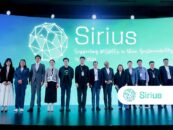
Project Savannah, a Blueprint to Simplify ESG Integration for Small Businesses
by Johanan Devanesan February 21, 2024In an era where sustainability is not just a preference but a necessity, the dialogue around environmental, social, and governance (ESG) practices has taken centre stage for major corporations. But amidst this evolving discourse, micro, small, and medium-sized enterprises (MSMEs) have been frequently marginalised players, despite pivotal roles in global supply chains, leading to the development of Project Savannah.
Project Savannah stands out as an initiative designed to more effectively weave these overlooked entities, which form the backbone of the global economy, into the broader tapestry of global ESG practices that have been mandated for larger companies. Discussed extensively at Elevandi Insights 2023 during the Singapore Fintech Festival last year, this initiative underscores an imperative for a harmonised approach to ESG reporting tailored for MSMEs.
The Significance of MSMEs in the Global Economy
MSMEs form the bedrock of global economic stability and growth, accounting for up to 90% of businesses across the world. They are instrumental in creating more than two-thirds of employment opportunities (70%) and contributing significantly to more than half of global Gross Domestic Product (GDP).
Despite their monumental role, these small and micro enterprises face considerable challenges in adhering to ESG reporting standards, primarily due to existing frameworks being cumbersome and designed with larger corporations in mind, according to a study on Project Savannah published by KPMG in Singapore and Elevandi.
According to the report, MSMEs’ path to ESG integration is strewn with sizable obstacles. Constrained resources, a lack of readily available information on financing and collaboration, and a lack of ESG expertise markedly hold back their ability to engage in sustainability reporting. This discrepancy is not merely a resource issue, but also reflects a wider gap in inclusivity and accessibility within the global sustainability outlook.

Source: “Project Savannah – Maximising the potential ESG credentials for MSMEs” KPMG and Elevandi
Pioneering Role of Project Savannah
Initiated by the United Nations Development Programme (UNDP), the Monetary Authority of Singapore (MAS), and the Global Legal Entity Identifier Foundation (GLEIF), Project Savannah aims directly at these challenges. The project’s development of basic ESG digital credentials for MSMEs seeks to promote green inclusion, improving access to green financing and opportunities in cross-border supply chains.
This collective endeavour between governmental bodies, financial institutions, and technology providers is designed to demystify and deconstruct the complexities surrounding ESG integration for MSMEs into more approachable and manageable actions.
Central to Project Savannah is the ambition to streamline the ESG reporting process for MSMEs. Through the standardisation of ESG metrics and the utilisation of technology for data gathering, verification, and interoperability, the initiative aims to empower MSMEs to objectively evaluate their impacts and actively engage in the global ESG agenda.
Moreover, Project Savannah envisions ensuring robust and reliable reporting mechanisms by utilising verified-at-source data and facilitating links to third-party assurance.

Addressing the Digital Divide Through Innovation
The digital transformation necessary for ESG reporting is yet another hurdle for MSMEs, many of which are non-digitalised due to constraints in resources and access to affordable technological solutions.
Recognising this digital divide, Project Savannah aspires to mitigate it by collaborating with tech solution providers and leveraging technology to ease the ESG data collection and reporting processes.
The project aims to adapt technology adoption to the specific needs of MSMEs, thereby facilitating their transition into the digital age and enabling their participation in sustainable practices.
Advocating for a Unified Global Framework
The current landscape of global ESG reporting standards is characterised by fragmentation and complexity, making it daunting for MSMEs to comply. Project Savannah champions the cause for a unified global framework that recognises and addresses the unique challenges MSMEs face.
By employing the Global Legal Entity Identifier (GLEIF) for global ESG reporting and developing metrics in partnership with UNDP regional offices, the project sets out to offer a practical and accessible solution for MSMEs to implement foundational ESG disclosures.

The Critical Role of Education and Capacity Building
An essential component of Project Savannah’s strategy involves education and capacity building among MSMEs. The KPMG and Elevandi data study details how tailored educational programs and simplified reporting requirements will be vital to bridging the ESG knowledge gap.
Customising these metrics for MSMEs, coupled with the deployment of technology for efficient data collection and verification, will enhance smaller businesses’ ability to actively partake in the global ESG agenda.
Fostering Collaborative Ecosystems
The project also emphasises the importance of creating collaborative ecosystems that include MSMEs, multinational corporations, financial institutions, and non-governmental organisations (NGOs). Such ecosystems can facilitate the sharing of best practices, provide access to necessary resources, and offer platforms for dialogue and exchange.
By fostering these collaborative spaces, Project Savannah aims to cultivate a supportive environment for MSMEs in their sustainability journey, and to incorporate them into a global sustainability drive involving all major industries and supply chains.
Project Savannah marks a significant step forward in integrating MSMEs into the global sustainability narrative. By confronting the unique challenges these entities face in ESG reporting, the initiative not only aims to bolster their sustainability efforts but also to reinforce their critical role in the global economy.
Through a combination of collaborative efforts, technological solutions, and a unified global framework, Project Savannah seeks to empower MSMEs to navigate the obstacles before them and to contribute meaningfully to the global ESG agenda. This joint endeavour not only highlights the necessity of including MSMEs in the sustainability conversation, but also reflects the collective commitment of the international community towards fostering a more inclusive and sustainable global economic landscape.
Get the hottest Fintech Singapore News once a month in your Inbox





